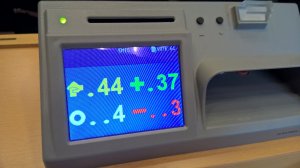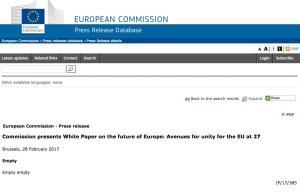
I recently met with some students following the Europe in the World programme at the Utrecht School of Journalism. They wanted to know more about the investigation I did into the Dieselgate scandal, so I gave them some tips on how to do investigative journalism. I also prepared a document with some useful websites and how to use them, and there is not really a reason not to share this with the wider world. So if you are covering the EU, or even if you are covering local or national politics in Europe, some of the following websites may be relevant. They may be old news to the regular Brussels gang, but there may be some gems that make your life easier. First two larger sections, about 1) how to file freedom of information requests and 2) how the lifecycle of EU legislation works, followed by some specific websites

Freedom of information / access to documents www.asktheeu.org is a public website which helps you organise your freedom of information requests, and gives you reminders if a deadline has passed. Some tips:
Be specific. A document needs to exist for citizens to have the right to access it. Ask for documents you know will (have to) exist, like communication between member states and the European Commission on something member states are required to report by law. If they don’t, this can also be news.
Be patient / start in time. EU institutions have 15 working days to reply, and can extend this period by another 15 working days. They usually extend. Remind them if they haven’t replied on time.
Be persistent. Sometimes an EU institutions will argue that the public interest does not outweigh the interest of privacy. Consider whether you agree, and if not, file an appeal.
Include a postal address. For some reason, some EU institutions need a real postal address in order to reply. Sometimes they send you an actual letter by mail, which you can keep as a souvenir: you normally will have received the letter digitally via the asktheeu website.
Legislation The EU is all about laws: mostly directives and regulations. It can be very worthwhile to read them, even though you need some patience to read through the legalese. The legislative train is as follows: the European Commission publishes a proposal, often accompanied by a staff working document, which could be an impact assessment. Sometimes this secondary document contains interesting elements and reasons for certain decisions not in the actual proposed legislation. The proposal then needs to be adopted by the European Parliament and the Council of the EU before it can become law. The website http://eur-lex.europa.eu is very useful. If it is still a proposal: it always has a unique number, with the following format: COM/2016/031 [COM for Commission, 2016 for the year, and 31 because it is the 31st proposal of the year]. They also have a procedure number. This one has 2016/014 (COD) (COD stands for co-decision, meaning it is a legislative proposal that will be agreed through the co-decision procedure with Parliament and Council). If you search for that on Eur-lex (or a search engine), you should be able to find the text, as well as a subpage called ‘procedure‘. This gives you an idea where the proposal is in the legislative process.
Directives and legislation that are already law can sometimes be a source for a story. In the case of Dieselgate, regulation 715/2007 has article 13:
“Member States shall lay down the provisions on penalties applicable for infringement by manufacturers of the provisions of this Regulation and shall take all measures necessary to ensure that they are implemented. The penalties provided for must be effective, proportionate and dissuasive. Member States shall notify those provisions to the Commission by 2 January 2009 and shall notify it without delay of any subsequent amendment affecting them.”
So I filed an FOI request asking for the content of all member states’ notifications of provisions on penalties, as required by article 13 of regulation (EC) No 715/2007, of 20 June 2007. This gave me documents from most member states, and revealed that there is no consistency: some member states had introduced really low fines.

Voting (1) Legislation that is decided through co-decision can only become law if the EU parliament and Council agree. There is a website called http://www.votewatch.eu/ which provides the outcome of votes of all legislation of this parliament term [the previous ones are available for subscribers].
Voting (2) This voting calculator helps you calculate which combinations make up a qualified majority in the Council of the EU http://www.consilium.europa.eu/en/council-eu/voting-system/voting-calculator/
Lobbyists (1) Lobbyists have to be registered in the EU’s transparency register – but you can also use the website https://lobbyfacts.eu which is based on the same data but works a bit more intuitive. Be advised that the information on these websites are what lobbyists report themselves, and there have been errors. Also, many lobbyists have not registered.
Lobbyists (2) Since the administration of Jean-Claude Juncker took over the European Commission, commissioners are required to disclose which meetings they had and with whom. http://www.integritywatch.eu/ is a useful website that allows you to find out who they have been meeting.

European Commission press release database http://europa.eu/rapid/search.htm
Statewatch is a website which sometimes publishes leaked documents http://www.statewatch.org/
EBS, website that broadcasts press conferences and debates. Also allows you to download them as MP3 or MP4 http://ec.europa.eu/avservices/ebs/schedule.cfm
European Parliament document database http://www.europarl.europa.eu/RegistreWeb/search/simpleSearchHome.htm?language=EN
Financial Transparency System – database of recipients of EU money http://ec.europa.eu/budget/fts/index_en.htm
Comitology register, of committees which adopt secondary legislation http://ec.europa.eu/transparency/regcomitology/index.cfm
Database with MEP questions http://www.europarl.europa.eu/plenary/en/parliamentary-questions.html
If you are a journalist covering the EU, feel free to add any useful websites in the comments, so that I may update this post in future!